Yi Jing Hexagram 29 - Line 2
The hexagram: 29
An hexagram is a combination of six yin and yang lines.

29.2 (29 > 8) - THE KHAN HEXAGRAM.
The second line, undivided, shows its subject in all the peril of the defile. He will, however, get a little (of the deliverance) that he seeks.
Bing DeepL Google Yandex29.2 (29 > 8) - Passing the buck
When one encounters difficulties that are too great, one leaves them to those who know how to handle them.
Bing DeepL Google Yandex29.2 (29 > 8) - Passing the buck
When one encounters difficulties that are too great, one leaves them to those who know how to handle them.
Bing DeepL Google Yandex29.2 (29 > 8) - K’ân, l’abîme
K’ān : danger, précipice, caverne. — Tsa k’ān : courir de grands risques ; s’exposer au danger pour un autre.
Dans les écueils périlleux, si on sait modérer ses sentiments, on pourra en sortir heureusement.
Si on garde la modération.
29.2 (29 > 8) - S'en remettre aux autres
Quand on rencontre des difficultés trop grandes, on laisse faire ceux qui savent les résoudre.
Bing DeepL Google Yandex29.2 (29 > 8) - Mélység
Ha valaki túl nagy nehézségekkel kerül szembe, rá kell hagynia olyanokra akik tudják kezelni azokat.
Bing DeepL Google YandexThe trigrams
The trigrams are combinations of three yin and yang lines. The three bottom lines of the hexagram form the lower trigram and represent the inner situation. The three top lines form the upper trigram and represent the outer situation.
trigSup

Lower trigram: The water The earth


The nuclear hexagram: 27.1 (27 > 23)
The nuclear hexagram is the association of the two inner trigrams (lines 2,3,4 and 3,4,5). It represents the root, or the origin of the situation.

27.1 (27 > 23) - THE Î HEXAGRAM.
The first line, undivided, (seems to be thus addressed), ‘You leave your efficacious tortoise, and look at me till your lower jaw hangs down.’ There will be evil.
Bing DeepL Google Yandex27.1 (27 > 23) - Lamenting one's failure
One is facing a difficult problem, but declines the support of their friends. One must let them act before the situation gets worse.
Bing DeepL Google Yandex27.1 (27 > 23) - Lamenting one's failure
One is facing a difficult problem, but declines the support of their friends. One must let them act before the situation gets worse.
Bing DeepL Google Yandex27.1 (27 > 23) - I, l’alimentation
Ī : 1. Entretenir, soutenir ; 2. Menton, côté de la bouche ; 3. Profond.
Laissant là votre tortue merveilleuse (l’une des quatre espèces d’êtres surnaturels), vous me regardez remuant le menton (2e sens) (pour manger). — (Expression consacrée, signifiant négliger les biens supérieurs pour s’attacher aux biens matériels.) C’est mal. — La tortue céleste qui indique l’avenir ne se peut manger ; aussi on la néglige.
Note. Animaux célestes indiquant par leurs apparitions les volontés du ciel et de l’avenir. Les autres sont la licorne, le dragon et le phénix.
27.1 (27 > 23) - Se lamenter sur son échec
On affronte un problème difficile mais on refuse l'aide de ses amis. On doit les laisser agir avant que la situation n'empire.
Bing DeepL Google Yandex27.1 (27 > 23) - Ellátás
Nehéz problémával kerül szembe de elutasítja a barátai támogatását. Engednie kell cselekedni őket mielőtt a helyzet rosszabbra fordul.
Bing DeepL Google YandexThe derived (Fan Yao)
The same line number on the mutated hexagram. It reperesents what can be done AFTER to correct the situation described by this line, as a sort of remedy or solution.
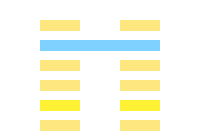
8.2 (8 > 29) - THE PÎ HEXAGRAM.
In the second line, divided, we see the movement towards union and attachment proceeding from the inward (mind). With firm correctness there will be good fortune.
Bing DeepL Google Yandex8.2 (8 > 29) - Make one's attachment credible
One commits oneself to help one's friends repairing their damage before others notice.
Bing DeepL Google Yandex8.2 (8 > 29) - Make one's attachment credible
One commits oneself to help one's friends repairing their damage before others notice.
Bing DeepL Google Yandex8.2 (8 > 29) - Pî, la solidarité
Pî : union, harmonie, rapprochement, aide
Si l’amour de la concorde provient du coeur, elle s’établira heureusement.
Elle ne faiblira pas de soi-même.
8.2 (8 > 29) - Crédibiliser son attachement
On s'engage pour aider ses amis à réparer leurs dégâts avant que les autres ne s'en aperçoivent.
Bing DeepL Google Yandex8.2 (8 > 29) - Elosztás
Elkötelezik magukat, hogy segítenek a barátaiknak megjavítani amit elhanyagoltak, mielőtt késő lenne.
Bing DeepL Google YandexThe juncture: 7.5
The derived of the reciprocal. It represents what could have been done BEFORE to prevent the situation described by this line, as a sort of remedy or solution.
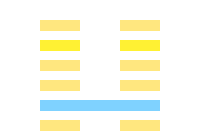
7.5 (7 > 29) - THE SZE HEXAGRAM.
The fifth line, divided, shows birds in the fields, which it will be advantageous to seize (and destroy). In that case there will be no error. If the oldest son leads the host, and younger men (idly occupy offices assigned to them), however firm and correct he may be, there will be evil.
Bing DeepL Google Yandex7.5 (7 > 29) - Giving a bonus to the experience
Something useful can be obtained, the most experienced will be able to succeed, another will be likely to damage it.
Bing DeepL Google Yandex7.5 (7 > 29) - Giving a bonus to the experience
Something useful can be obtained, the most experienced will be able to succeed, another will be likely to damage it.
Bing DeepL Google Yandex7.5 (7 > 29) - Sze, l’armée
Sze : chef ; troupes, armée ; peuple, foule.
Si le roi ne commande pas en personne, le fils aîné doit conduire l’armée ; si ce sont les fils cadets qui commandent, comme ils sont plusieurs, il y aura (division), faute et insuccès.
Bing DeepL Google Yandex7.5 (7 > 29) - Donner une prime à l'expérience
On peut obtenir quelque chose d'utile, le plus expérimenté sera capable d'y arriver, un autre risquera de l'endommager.
Bing DeepL Google Yandex7.5 (7 > 29) - Az akarat
Elérhetünk valami hasznosat, a legtapasztaltabb képes elérni, a másik elrontaná.
Bing DeepL Google YandexThe reciprocal: 29.5
The hexagram upside down. It represents the opposite situation, and as such is insturmental when validating comments.

29.5 (29 > 7) - THE KHAN HEXAGRAM.
The fifth line, undivided, shows the water of the defile not yet full, (so that it might flow away) ; but order will (soon) be brought about. There will be no error.
Bing DeepL Google Yandex29.5 (29 > 7) - Going on vacation
Before returning to help others, one must take a break and prepare oneself to answer to one's relatives.
Bing DeepL Google Yandex29.5 (29 > 7) - Going on vacation
Before returning to help others, one must take a break and prepare oneself to answer to one's relatives.
Bing DeepL Google Yandex29.5 (29 > 7) - K’ân, l’abîme
K’ān : danger, précipice, caverne. — Tsa k’ān : courir de grands risques ; s’exposer au danger pour un autre.
Mais si le danger n’est pas inéluctable, si une caverne où l’on se trouve n’est point pleine d’eau et qu’on puisse encore aplanir le terrain, on en sortira sans faute. — Il n’arrivera pas malheur.
Bing DeepL Google Yandex29.5 (29 > 7) - Partir en congés
Avant de retourner aider les autres, on doit faire une pause et se préparer à répondre à ses proches.
Bing DeepL Google Yandex29.5 (29 > 7) - Mélység
Mielőtt visszatérne hogy segítsen másokon, szünetet kell tartania és fel kell készülnie hogy válaszoljon a közelállóknak.
Bing DeepL Google YandexMutations

29.2 (29 > 8) - THE KHAN HEXAGRAM.
The second line, undivided, shows its subject in all the peril of the defile. He will, however, get a little (of the deliverance) that he seeks.
Bing DeepL Google Yandex29.2 (29 > 8) - Passing the buck
When one encounters difficulties that are too great, one leaves them to those who know how to handle them.
Bing DeepL Google Yandex29.2 (29 > 8) - Passing the buck
When one encounters difficulties that are too great, one leaves them to those who know how to handle them.
Bing DeepL Google Yandex29.2 (29 > 8) - K’ân, l’abîme
K’ān : danger, précipice, caverne. — Tsa k’ān : courir de grands risques ; s’exposer au danger pour un autre.
Dans les écueils périlleux, si on sait modérer ses sentiments, on pourra en sortir heureusement.
Si on garde la modération.
29.2 (29 > 8) - S'en remettre aux autres
Quand on rencontre des difficultés trop grandes, on laisse faire ceux qui savent les résoudre.
Bing DeepL Google Yandex29.2 (29 > 8) - Mélység
Ha valaki túl nagy nehézségekkel kerül szembe, rá kell hagynia olyanokra akik tudják kezelni azokat.
Bing DeepL Google Yandex
29.1.2 (29 > 3) - THE KHAN HEXAGRAM.
- 1. The first line, divided, shows its subject in the double defile, and (yet) entering a cavern within it. There will be evil.
- 2. The second line, undivided, shows its subject in all the peril of the defile. He will, however, get a little (of the deliverance) that he seeks.
29.1.2 (29 > 3) - Getting away with a pirouette
One thinks having made a blunder even though the others didn't notice anything.
Bing DeepL Google Yandex29.1.2 (29 > 3) - Getting away with a pirouette
One thinks having made a blunder even though the others didn't notice anything.
Bing DeepL Google Yandex29.1.2 (29 > 3) - K’ân, l’abîme
K’ān : danger, précipice, caverne. — Tsa k’ān : courir de grands risques ; s’exposer au danger pour un autre.
- 1. Courir des dangers, comme entrer dans une caverne d’un défilé dangereux, est chose redoutable.
-
2. Dans les écueils périlleux, si on sait modérer ses sentiments, on pourra en sortir heureusement.
Si on garde la modération.
29.1.2 (29 > 3) - S'en sortir avec une pirouette
On pense avoir commis une gaffe bien que les autres n'aient rien remarqué.
Bing DeepL Google Yandex29.1.2 (29 > 3) - Mélység
- 1. Ha egy nehézséggel találkozott, meg kell oldania mielőtt elkezdene foglalkozni egy másikkal.
- 2. Ha valaki túl nagy nehézségekkel kerül szembe, rá kell hagynia olyanokra akik tudják kezelni azokat.

29.2.3 (29 > 39) - THE KHAN HEXAGRAM.
- 2. The second line, undivided, shows its subject in all the peril of the defile. He will, however, get a little (of the deliverance) that he seeks.
- 3. The third line, divided, shows its subject, whether he comes or goes ( = descends or ascends), confronted by a defile. All is peril to him and unrest. (His endeavours) will lead him into the cavern of the pit. There should be no action (in such a case).
29.2.3 (29 > 39) - Refreshing one's skills
One remembers the times when one was able to master one's subject.
Bing DeepL Google Yandex29.2.3 (29 > 39) - Refreshing one's skills
One remembers the times when one was able to master one's subject.
Bing DeepL Google Yandex29.2.3 (29 > 39) - K’ân, l’abîme
K’ān : danger, précipice, caverne. — Tsa k’ān : courir de grands risques ; s’exposer au danger pour un autre.
-
2. Dans les écueils périlleux, si on sait modérer ses sentiments, on pourra en sortir heureusement.
Si on garde la modération. - 3. Si en tout et partout on ne rencontre que danger, que les périls, les sujets de crainte s’accumulent, alors dans un tel danger, il n’y a plus d’expédient qui puisse servir. — Il n’y aura plus de secours possible.
29.2.3 (29 > 39) - Se remettre à niveau
On se souvient des fois où l'on avait pu maîtriser son sujet.
Bing DeepL Google Yandex29.2.3 (29 > 39) - Mélység
- 2. Ha valaki túl nagy nehézségekkel kerül szembe, rá kell hagynia olyanokra akik tudják kezelni azokat.
- 3. Látják amit elrontott így odébbáll.

29.1.2.3 (29 > 63) - THE KHAN HEXAGRAM.
- 1. The first line, divided, shows its subject in the double defile, and (yet) entering a cavern within it. There will be evil.
- 2. The second line, undivided, shows its subject in all the peril of the defile. He will, however, get a little (of the deliverance) that he seeks.
- 3. The third line, divided, shows its subject, whether he comes or goes ( = descends or ascends), confronted by a defile. All is peril to him and unrest. (His endeavours) will lead him into the cavern of the pit. There should be no action (in such a case).
29.1.2.3 (29 > 63) - Being governed by anger
One crystallizes one's rejections after having been the victim of an attack that one had feared.
Bing DeepL Google Yandex29.1.2.3 (29 > 63) - Being governed by anger
One crystallizes one's rejections after having been the victim of an attack that one had feared.
Bing DeepL Google Yandex29.1.2.3 (29 > 63) - K’ân, l’abîme
K’ān : danger, précipice, caverne. — Tsa k’ān : courir de grands risques ; s’exposer au danger pour un autre.
- 1. Courir des dangers, comme entrer dans une caverne d’un défilé dangereux, est chose redoutable.
-
2. Dans les écueils périlleux, si on sait modérer ses sentiments, on pourra en sortir heureusement.
Si on garde la modération. - 3. Si en tout et partout on ne rencontre que danger, que les périls, les sujets de crainte s’accumulent, alors dans un tel danger, il n’y a plus d’expédient qui puisse servir. — Il n’y aura plus de secours possible.
29.1.2.3 (29 > 63) - Être gouverné par la colère
On cristallise ses rejets après avoir été la victime d'une attaque que l'on avait redoutée.
Bing DeepL Google Yandex29.1.2.3 (29 > 63) - Mélység
- 1. Ha egy nehézséggel találkozott, meg kell oldania mielőtt elkezdene foglalkozni egy másikkal.
- 2. Ha valaki túl nagy nehézségekkel kerül szembe, rá kell hagynia olyanokra akik tudják kezelni azokat.
- 3. Látják amit elrontott így odébbáll.

29.2.4 (29 > 45) - THE KHAN HEXAGRAM.
- 2. The second line, undivided, shows its subject in all the peril of the defile. He will, however, get a little (of the deliverance) that he seeks.
- 4. The fourth line, divided, shows its subject (at a feast), with (simply) a bottle of spirits, and a subsidiary basket of rice, while (the cups and bowls) are (only) of earthenware. He introduces his important lessons (as his ruler's) intelligence admits. There will in the end be no error.
29.2.4 (29 > 45) - Improvising a solution
One is sad that one cannot do more to help one's friends.
Bing DeepL Google Yandex29.2.4 (29 > 45) - Improvising a solution
One is sad that one cannot do more to help one's friends.
Bing DeepL Google Yandex29.2.4 (29 > 45) - K’ân, l’abîme
K’ān : danger, précipice, caverne. — Tsa k’ān : courir de grands risques ; s’exposer au danger pour un autre.
-
2. Dans les écueils périlleux, si on sait modérer ses sentiments, on pourra en sortir heureusement.
Si on garde la modération. - 4. Si l’on offre des sacrifices avec simplicité (sans ostentation), avec un vase de spiritueux et une corbeille de grains, tandis que les assistants n’ont que des vases de terre, si par cette modération on se forme à la vertu, alors qu’on aurait d’abord des difficultés et des écueils, on deviendra irréprochable. (Moyen d’éviter les dangers.)
29.2.4 (29 > 45) - Improviser une solution
On est triste de ne pas pouvoir faire davantage pour aider ses amis.
Bing DeepL Google Yandex29.2.4 (29 > 45) - Mélység
- 2. Ha valaki túl nagy nehézségekkel kerül szembe, rá kell hagynia olyanokra akik tudják kezelni azokat.
- 4. Ha valaki eszközök híján van, meg kell elégednie egyszerű dolgokkal.

29.1.2.4 (29 > 17) - THE KHAN HEXAGRAM.
- 1. The first line, divided, shows its subject in the double defile, and (yet) entering a cavern within it. There will be evil.
- 2. The second line, undivided, shows its subject in all the peril of the defile. He will, however, get a little (of the deliverance) that he seeks.
- 4. The fourth line, divided, shows its subject (at a feast), with (simply) a bottle of spirits, and a subsidiary basket of rice, while (the cups and bowls) are (only) of earthenware. He introduces his important lessons (as his ruler's) intelligence admits. There will in the end be no error.
29.1.2.4 (29 > 17) - Not making too many concessions
One refuses to let others take command of operations.
Bing DeepL Google Yandex29.1.2.4 (29 > 17) - Not making too many concessions
One refuses to let others take command of operations.
Bing DeepL Google Yandex29.1.2.4 (29 > 17) - K’ân, l’abîme
K’ān : danger, précipice, caverne. — Tsa k’ān : courir de grands risques ; s’exposer au danger pour un autre.
- 1. Courir des dangers, comme entrer dans une caverne d’un défilé dangereux, est chose redoutable.
-
2. Dans les écueils périlleux, si on sait modérer ses sentiments, on pourra en sortir heureusement.
Si on garde la modération. - 4. Si l’on offre des sacrifices avec simplicité (sans ostentation), avec un vase de spiritueux et une corbeille de grains, tandis que les assistants n’ont que des vases de terre, si par cette modération on se forme à la vertu, alors qu’on aurait d’abord des difficultés et des écueils, on deviendra irréprochable. (Moyen d’éviter les dangers.)
29.1.2.4 (29 > 17) - Ne pas trop faire de concessions
On refuse de laisser les autres prendre le commandement des opérations.
Bing DeepL Google Yandex29.1.2.4 (29 > 17) - Mélység
- 1. Ha egy nehézséggel találkozott, meg kell oldania mielőtt elkezdene foglalkozni egy másikkal.
- 2. Ha valaki túl nagy nehézségekkel kerül szembe, rá kell hagynia olyanokra akik tudják kezelni azokat.
- 4. Ha valaki eszközök híján van, meg kell elégednie egyszerű dolgokkal.

29.2.3.4 (29 > 31) - THE KHAN HEXAGRAM.
- 2. The second line, undivided, shows its subject in all the peril of the defile. He will, however, get a little (of the deliverance) that he seeks.
- 3. The third line, divided, shows its subject, whether he comes or goes ( = descends or ascends), confronted by a defile. All is peril to him and unrest. (His endeavours) will lead him into the cavern of the pit. There should be no action (in such a case).
- 4. The fourth line, divided, shows its subject (at a feast), with (simply) a bottle of spirits, and a subsidiary basket of rice, while (the cups and bowls) are (only) of earthenware. He introduces his important lessons (as his ruler's) intelligence admits. There will in the end be no error.
29.2.3.4 (29 > 31) - The palaver tree
One listens to others before giving them one's opinion.
Bing DeepL Google Yandex29.2.3.4 (29 > 31) - The palaver tree
One listens to others before giving them one's opinion.
Bing DeepL Google Yandex29.2.3.4 (29 > 31) - K’ân, l’abîme
K’ān : danger, précipice, caverne. — Tsa k’ān : courir de grands risques ; s’exposer au danger pour un autre.
-
2. Dans les écueils périlleux, si on sait modérer ses sentiments, on pourra en sortir heureusement.
Si on garde la modération. - 3. Si en tout et partout on ne rencontre que danger, que les périls, les sujets de crainte s’accumulent, alors dans un tel danger, il n’y a plus d’expédient qui puisse servir. — Il n’y aura plus de secours possible.
- 4. Si l’on offre des sacrifices avec simplicité (sans ostentation), avec un vase de spiritueux et une corbeille de grains, tandis que les assistants n’ont que des vases de terre, si par cette modération on se forme à la vertu, alors qu’on aurait d’abord des difficultés et des écueils, on deviendra irréprochable. (Moyen d’éviter les dangers.)
29.2.3.4 (29 > 31) - L'arbre à palabres
On écoute parler les autres avant de leur donner son avis.
Bing DeepL Google Yandex29.2.3.4 (29 > 31) - Mélység
- 2. Ha valaki túl nagy nehézségekkel kerül szembe, rá kell hagynia olyanokra akik tudják kezelni azokat.
- 3. Látják amit elrontott így odébbáll.
- 4. Ha valaki eszközök híján van, meg kell elégednie egyszerű dolgokkal.

29.1.2.3.4 (29 > 49) - THE KHAN HEXAGRAM.
- 1. The first line, divided, shows its subject in the double defile, and (yet) entering a cavern within it. There will be evil.
- 2. The second line, undivided, shows its subject in all the peril of the defile. He will, however, get a little (of the deliverance) that he seeks.
- 3. The third line, divided, shows its subject, whether he comes or goes ( = descends or ascends), confronted by a defile. All is peril to him and unrest. (His endeavours) will lead him into the cavern of the pit. There should be no action (in such a case).
- 4. The fourth line, divided, shows its subject (at a feast), with (simply) a bottle of spirits, and a subsidiary basket of rice, while (the cups and bowls) are (only) of earthenware. He introduces his important lessons (as his ruler's) intelligence admits. There will in the end be no error.
29.1.2.3.4 (29 > 49) - Committing the forbidden
One gets busy on a project that others condemn.
Bing DeepL Google Yandex29.1.2.3.4 (29 > 49) - Committing the forbidden
One gets busy on a project that others condemn.
Bing DeepL Google Yandex29.1.2.3.4 (29 > 49) - K’ân, l’abîme
K’ān : danger, précipice, caverne. — Tsa k’ān : courir de grands risques ; s’exposer au danger pour un autre.
- 1. Courir des dangers, comme entrer dans une caverne d’un défilé dangereux, est chose redoutable.
-
2. Dans les écueils périlleux, si on sait modérer ses sentiments, on pourra en sortir heureusement.
Si on garde la modération. - 3. Si en tout et partout on ne rencontre que danger, que les périls, les sujets de crainte s’accumulent, alors dans un tel danger, il n’y a plus d’expédient qui puisse servir. — Il n’y aura plus de secours possible.
- 4. Si l’on offre des sacrifices avec simplicité (sans ostentation), avec un vase de spiritueux et une corbeille de grains, tandis que les assistants n’ont que des vases de terre, si par cette modération on se forme à la vertu, alors qu’on aurait d’abord des difficultés et des écueils, on deviendra irréprochable. (Moyen d’éviter les dangers.)
29.1.2.3.4 (29 > 49) - Braver les interdits
On s'affaire autour d'un projet que les autres condamnent.
Bing DeepL Google Yandex29.1.2.3.4 (29 > 49) - Mélység
- 1. Ha egy nehézséggel találkozott, meg kell oldania mielőtt elkezdene foglalkozni egy másikkal.
- 2. Ha valaki túl nagy nehézségekkel kerül szembe, rá kell hagynia olyanokra akik tudják kezelni azokat.
- 3. Látják amit elrontott így odébbáll.
- 4. Ha valaki eszközök híján van, meg kell elégednie egyszerű dolgokkal.

29.2.5 (29 > 2) - THE KHAN HEXAGRAM.
- 2. The second line, undivided, shows its subject in all the peril of the defile. He will, however, get a little (of the deliverance) that he seeks.
- 5. The fifth line, undivided, shows the water of the defile not yet full, (so that it might flow away) ; but order will (soon) be brought about. There will be no error.
29.2.5 (29 > 2) - K’ân, l’abîme
K’ān : danger, précipice, caverne. — Tsa k’ān : courir de grands risques ; s’exposer au danger pour un autre.
-
2. Dans les écueils périlleux, si on sait modérer ses sentiments, on pourra en sortir heureusement.
Si on garde la modération. - 5. Mais si le danger n’est pas inéluctable, si une caverne où l’on se trouve n’est point pleine d’eau et qu’on puisse encore aplanir le terrain, on en sortira sans faute. — Il n’arrivera pas malheur.
29.2.5 (29 > 2) - Mélység
- 2. Ha valaki túl nagy nehézségekkel kerül szembe, rá kell hagynia olyanokra akik tudják kezelni azokat.
- 5. Mielőtt visszatérne hogy segítsen másokon, szünetet kell tartania és fel kell készülnie hogy válaszoljon a közelállóknak.

29.1.2.5 (29 > 24) - THE KHAN HEXAGRAM.
- 1. The first line, divided, shows its subject in the double defile, and (yet) entering a cavern within it. There will be evil.
- 2. The second line, undivided, shows its subject in all the peril of the defile. He will, however, get a little (of the deliverance) that he seeks.
- 5. The fifth line, undivided, shows the water of the defile not yet full, (so that it might flow away) ; but order will (soon) be brought about. There will be no error.
29.1.2.5 (29 > 24) - Ducking one's responsibilities
One takes refuge behind those one must defend.
Bing DeepL Google Yandex29.1.2.5 (29 > 24) - Ducking one's responsibilities
One takes refuge behind those one must defend.
Bing DeepL Google Yandex29.1.2.5 (29 > 24) - K’ân, l’abîme
K’ān : danger, précipice, caverne. — Tsa k’ān : courir de grands risques ; s’exposer au danger pour un autre.
- 1. Courir des dangers, comme entrer dans une caverne d’un défilé dangereux, est chose redoutable.
-
2. Dans les écueils périlleux, si on sait modérer ses sentiments, on pourra en sortir heureusement.
Si on garde la modération. - 5. Mais si le danger n’est pas inéluctable, si une caverne où l’on se trouve n’est point pleine d’eau et qu’on puisse encore aplanir le terrain, on en sortira sans faute. — Il n’arrivera pas malheur.
29.1.2.5 (29 > 24) - Fuir ses responsabilités
On se réfugie derrière ceux que l'on doit défendre.
Bing DeepL Google Yandex29.1.2.5 (29 > 24) - Mélység
- 1. Ha egy nehézséggel találkozott, meg kell oldania mielőtt elkezdene foglalkozni egy másikkal.
- 2. Ha valaki túl nagy nehézségekkel kerül szembe, rá kell hagynia olyanokra akik tudják kezelni azokat.
- 5. Mielőtt visszatérne hogy segítsen másokon, szünetet kell tartania és fel kell készülnie hogy válaszoljon a közelállóknak.
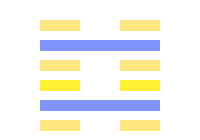
29.2.3.5 (29 > 15) - THE KHAN HEXAGRAM.
- 2. The second line, undivided, shows its subject in all the peril of the defile. He will, however, get a little (of the deliverance) that he seeks.
- 3. The third line, divided, shows its subject, whether he comes or goes ( = descends or ascends), confronted by a defile. All is peril to him and unrest. (His endeavours) will lead him into the cavern of the pit. There should be no action (in such a case).
- 5. The fifth line, undivided, shows the water of the defile not yet full, (so that it might flow away) ; but order will (soon) be brought about. There will be no error.
29.2.3.5 (29 > 15) - Losing ground
One warns one's friends that there will be more difficulties than expected.
Bing DeepL Google Yandex29.2.3.5 (29 > 15) - Losing ground
One warns one's friends that there will be more difficulties than expected.
Bing DeepL Google Yandex29.2.3.5 (29 > 15) - K’ân, l’abîme
K’ān : danger, précipice, caverne. — Tsa k’ān : courir de grands risques ; s’exposer au danger pour un autre.
-
2. Dans les écueils périlleux, si on sait modérer ses sentiments, on pourra en sortir heureusement.
Si on garde la modération. - 3. Si en tout et partout on ne rencontre que danger, que les périls, les sujets de crainte s’accumulent, alors dans un tel danger, il n’y a plus d’expédient qui puisse servir. — Il n’y aura plus de secours possible.
- 5. Mais si le danger n’est pas inéluctable, si une caverne où l’on se trouve n’est point pleine d’eau et qu’on puisse encore aplanir le terrain, on en sortira sans faute. — Il n’arrivera pas malheur.
29.2.3.5 (29 > 15) - Perdre pied
On prévient ses amis que l'on aura davantage de difficultés que prévu.
Bing DeepL Google Yandex29.2.3.5 (29 > 15) - Mélység
- 2. Ha valaki túl nagy nehézségekkel kerül szembe, rá kell hagynia olyanokra akik tudják kezelni azokat.
- 3. Látják amit elrontott így odébbáll.
- 5. Mielőtt visszatérne hogy segítsen másokon, szünetet kell tartania és fel kell készülnie hogy válaszoljon a közelállóknak.

29.1.2.3.5 (29 > 36) - THE KHAN HEXAGRAM.
- 1. The first line, divided, shows its subject in the double defile, and (yet) entering a cavern within it. There will be evil.
- 2. The second line, undivided, shows its subject in all the peril of the defile. He will, however, get a little (of the deliverance) that he seeks.
- 3. The third line, divided, shows its subject, whether he comes or goes ( = descends or ascends), confronted by a defile. All is peril to him and unrest. (His endeavours) will lead him into the cavern of the pit. There should be no action (in such a case).
- 5. The fifth line, undivided, shows the water of the defile not yet full, (so that it might flow away) ; but order will (soon) be brought about. There will be no error.
29.1.2.3.5 (29 > 36) - Staying in one's inner circle
One often goes to see one's friends to have a good time with them.
Bing DeepL Google Yandex29.1.2.3.5 (29 > 36) - Staying in one's inner circle
One often goes to see one's friends to have a good time with them.
Bing DeepL Google Yandex29.1.2.3.5 (29 > 36) - K’ân, l’abîme
K’ān : danger, précipice, caverne. — Tsa k’ān : courir de grands risques ; s’exposer au danger pour un autre.
- 1. Courir des dangers, comme entrer dans une caverne d’un défilé dangereux, est chose redoutable.
-
2. Dans les écueils périlleux, si on sait modérer ses sentiments, on pourra en sortir heureusement.
Si on garde la modération. - 3. Si en tout et partout on ne rencontre que danger, que les périls, les sujets de crainte s’accumulent, alors dans un tel danger, il n’y a plus d’expédient qui puisse servir. — Il n’y aura plus de secours possible.
- 5. Mais si le danger n’est pas inéluctable, si une caverne où l’on se trouve n’est point pleine d’eau et qu’on puisse encore aplanir le terrain, on en sortira sans faute. — Il n’arrivera pas malheur.
29.1.2.3.5 (29 > 36) - Rester dans son cercle intime
On va souvent voir ses amis pour passer du bon temps avec eux.
Bing DeepL Google Yandex29.1.2.3.5 (29 > 36) - Mélység
- 1. Ha egy nehézséggel találkozott, meg kell oldania mielőtt elkezdene foglalkozni egy másikkal.
- 2. Ha valaki túl nagy nehézségekkel kerül szembe, rá kell hagynia olyanokra akik tudják kezelni azokat.
- 3. Látják amit elrontott így odébbáll.
- 5. Mielőtt visszatérne hogy segítsen másokon, szünetet kell tartania és fel kell készülnie hogy válaszoljon a közelállóknak.
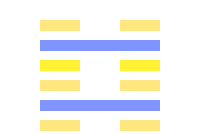
29.2.4.5 (29 > 16) - THE KHAN HEXAGRAM.
- 2. The second line, undivided, shows its subject in all the peril of the defile. He will, however, get a little (of the deliverance) that he seeks.
- 4. The fourth line, divided, shows its subject (at a feast), with (simply) a bottle of spirits, and a subsidiary basket of rice, while (the cups and bowls) are (only) of earthenware. He introduces his important lessons (as his ruler's) intelligence admits. There will in the end be no error.
- 5. The fifth line, undivided, shows the water of the defile not yet full, (so that it might flow away) ; but order will (soon) be brought about. There will be no error.
29.2.4.5 (29 > 16) - Going back into the ring
One puts one's title on the line to compete against one's opponents.
Bing DeepL Google Yandex29.2.4.5 (29 > 16) - Going back into the ring
One puts one's title on the line to compete against one's opponents.
Bing DeepL Google Yandex29.2.4.5 (29 > 16) - K’ân, l’abîme
K’ān : danger, précipice, caverne. — Tsa k’ān : courir de grands risques ; s’exposer au danger pour un autre.
-
2. Dans les écueils périlleux, si on sait modérer ses sentiments, on pourra en sortir heureusement.
Si on garde la modération. - 4. Si l’on offre des sacrifices avec simplicité (sans ostentation), avec un vase de spiritueux et une corbeille de grains, tandis que les assistants n’ont que des vases de terre, si par cette modération on se forme à la vertu, alors qu’on aurait d’abord des difficultés et des écueils, on deviendra irréprochable. (Moyen d’éviter les dangers.)
- 5. Mais si le danger n’est pas inéluctable, si une caverne où l’on se trouve n’est point pleine d’eau et qu’on puisse encore aplanir le terrain, on en sortira sans faute. — Il n’arrivera pas malheur.
29.2.4.5 (29 > 16) - Remonter sur le ring
On remet son titre en jeu pour se mesurer à ses opposants.
Bing DeepL Google Yandex29.2.4.5 (29 > 16) - Mélység
- 2. Ha valaki túl nagy nehézségekkel kerül szembe, rá kell hagynia olyanokra akik tudják kezelni azokat.
- 4. Ha valaki eszközök híján van, meg kell elégednie egyszerű dolgokkal.
- 5. Mielőtt visszatérne hogy segítsen másokon, szünetet kell tartania és fel kell készülnie hogy válaszoljon a közelállóknak.
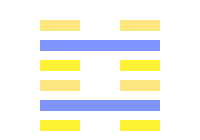
29.1.2.4.5 (29 > 51) - THE KHAN HEXAGRAM.
- 1. The first line, divided, shows its subject in the double defile, and (yet) entering a cavern within it. There will be evil.
- 2. The second line, undivided, shows its subject in all the peril of the defile. He will, however, get a little (of the deliverance) that he seeks.
- 4. The fourth line, divided, shows its subject (at a feast), with (simply) a bottle of spirits, and a subsidiary basket of rice, while (the cups and bowls) are (only) of earthenware. He introduces his important lessons (as his ruler's) intelligence admits. There will in the end be no error.
- 5. The fifth line, undivided, shows the water of the defile not yet full, (so that it might flow away) ; but order will (soon) be brought about. There will be no error.
29.1.2.4.5 (29 > 51) - Not wanting to serve
One is reluctant to make more efforts for others to benefit.
Bing DeepL Google Yandex29.1.2.4.5 (29 > 51) - Not wanting to serve
One is reluctant to make more efforts for others to benefit.
Bing DeepL Google Yandex29.1.2.4.5 (29 > 51) - K’ân, l’abîme
K’ān : danger, précipice, caverne. — Tsa k’ān : courir de grands risques ; s’exposer au danger pour un autre.
- 1. Courir des dangers, comme entrer dans une caverne d’un défilé dangereux, est chose redoutable.
-
2. Dans les écueils périlleux, si on sait modérer ses sentiments, on pourra en sortir heureusement.
Si on garde la modération. - 4. Si l’on offre des sacrifices avec simplicité (sans ostentation), avec un vase de spiritueux et une corbeille de grains, tandis que les assistants n’ont que des vases de terre, si par cette modération on se forme à la vertu, alors qu’on aurait d’abord des difficultés et des écueils, on deviendra irréprochable. (Moyen d’éviter les dangers.)
- 5. Mais si le danger n’est pas inéluctable, si une caverne où l’on se trouve n’est point pleine d’eau et qu’on puisse encore aplanir le terrain, on en sortira sans faute. — Il n’arrivera pas malheur.
29.1.2.4.5 (29 > 51) - Ne pas vouloir rendre service
On répugne à faire davantage d'efforts pour que les autres en profitent.
Bing DeepL Google Yandex29.1.2.4.5 (29 > 51) - Mélység
- 1. Ha egy nehézséggel találkozott, meg kell oldania mielőtt elkezdene foglalkozni egy másikkal.
- 2. Ha valaki túl nagy nehézségekkel kerül szembe, rá kell hagynia olyanokra akik tudják kezelni azokat.
- 4. Ha valaki eszközök híján van, meg kell elégednie egyszerű dolgokkal.
- 5. Mielőtt visszatérne hogy segítsen másokon, szünetet kell tartania és fel kell készülnie hogy válaszoljon a közelállóknak.

29.2.3.4.5 (29 > 62) - THE KHAN HEXAGRAM.
- 2. The second line, undivided, shows its subject in all the peril of the defile. He will, however, get a little (of the deliverance) that he seeks.
- 3. The third line, divided, shows its subject, whether he comes or goes ( = descends or ascends), confronted by a defile. All is peril to him and unrest. (His endeavours) will lead him into the cavern of the pit. There should be no action (in such a case).
- 4. The fourth line, divided, shows its subject (at a feast), with (simply) a bottle of spirits, and a subsidiary basket of rice, while (the cups and bowls) are (only) of earthenware. He introduces his important lessons (as his ruler's) intelligence admits. There will in the end be no error.
- 5. The fifth line, undivided, shows the water of the defile not yet full, (so that it might flow away) ; but order will (soon) be brought about. There will be no error.
29.2.3.4.5 (29 > 62) - Visiting one last time
One sees one's friends again to say farewell.
Bing DeepL Google Yandex29.2.3.4.5 (29 > 62) - Visiting one last time
One sees one's friends again to say farewell.
Bing DeepL Google Yandex29.2.3.4.5 (29 > 62) - K’ân, l’abîme
K’ān : danger, précipice, caverne. — Tsa k’ān : courir de grands risques ; s’exposer au danger pour un autre.
-
2. Dans les écueils périlleux, si on sait modérer ses sentiments, on pourra en sortir heureusement.
Si on garde la modération. - 3. Si en tout et partout on ne rencontre que danger, que les périls, les sujets de crainte s’accumulent, alors dans un tel danger, il n’y a plus d’expédient qui puisse servir. — Il n’y aura plus de secours possible.
- 4. Si l’on offre des sacrifices avec simplicité (sans ostentation), avec un vase de spiritueux et une corbeille de grains, tandis que les assistants n’ont que des vases de terre, si par cette modération on se forme à la vertu, alors qu’on aurait d’abord des difficultés et des écueils, on deviendra irréprochable. (Moyen d’éviter les dangers.)
- 5. Mais si le danger n’est pas inéluctable, si une caverne où l’on se trouve n’est point pleine d’eau et qu’on puisse encore aplanir le terrain, on en sortira sans faute. — Il n’arrivera pas malheur.
29.2.3.4.5 (29 > 62) - Rendre visite une dernière fois
On revoit ses amis pour leur dire adieu.
Bing DeepL Google Yandex29.2.3.4.5 (29 > 62) - Mélység
- 2. Ha valaki túl nagy nehézségekkel kerül szembe, rá kell hagynia olyanokra akik tudják kezelni azokat.
- 3. Látják amit elrontott így odébbáll.
- 4. Ha valaki eszközök híján van, meg kell elégednie egyszerű dolgokkal.
- 5. Mielőtt visszatérne hogy segítsen másokon, szünetet kell tartania és fel kell készülnie hogy válaszoljon a közelállóknak.

29.1.2.3.4.5 (29 > 55) - THE KHAN HEXAGRAM.
- 1. The first line, divided, shows its subject in the double defile, and (yet) entering a cavern within it. There will be evil.
- 2. The second line, undivided, shows its subject in all the peril of the defile. He will, however, get a little (of the deliverance) that he seeks.
- 3. The third line, divided, shows its subject, whether he comes or goes ( = descends or ascends), confronted by a defile. All is peril to him and unrest. (His endeavours) will lead him into the cavern of the pit. There should be no action (in such a case).
- 4. The fourth line, divided, shows its subject (at a feast), with (simply) a bottle of spirits, and a subsidiary basket of rice, while (the cups and bowls) are (only) of earthenware. He introduces his important lessons (as his ruler's) intelligence admits. There will in the end be no error.
- 5. The fifth line, undivided, shows the water of the defile not yet full, (so that it might flow away) ; but order will (soon) be brought about. There will be no error.
29.1.2.3.4.5 (29 > 55) - Spreading discomfort
One disturbs others by talking to them about disgusting things.
29.1.2.3.4.5 (29 > 55) - Spreading discomfort
One disturbs others by talking to them about disgusting things.
29.1.2.3.4.5 (29 > 55) - K’ân, l’abîme
K’ān : danger, précipice, caverne. — Tsa k’ān : courir de grands risques ; s’exposer au danger pour un autre.
- 1. Courir des dangers, comme entrer dans une caverne d’un défilé dangereux, est chose redoutable.
-
2. Dans les écueils périlleux, si on sait modérer ses sentiments, on pourra en sortir heureusement.
Si on garde la modération. - 3. Si en tout et partout on ne rencontre que danger, que les périls, les sujets de crainte s’accumulent, alors dans un tel danger, il n’y a plus d’expédient qui puisse servir. — Il n’y aura plus de secours possible.
- 4. Si l’on offre des sacrifices avec simplicité (sans ostentation), avec un vase de spiritueux et une corbeille de grains, tandis que les assistants n’ont que des vases de terre, si par cette modération on se forme à la vertu, alors qu’on aurait d’abord des difficultés et des écueils, on deviendra irréprochable. (Moyen d’éviter les dangers.)
- 5. Mais si le danger n’est pas inéluctable, si une caverne où l’on se trouve n’est point pleine d’eau et qu’on puisse encore aplanir le terrain, on en sortira sans faute. — Il n’arrivera pas malheur.
29.1.2.3.4.5 (29 > 55) - Répandre la gêne
On perturbe les autres en leur parlant de choses dégoûtantes.
Bing DeepL Google Yandex29.1.2.3.4.5 (29 > 55) - Mélység
- 1. Ha egy nehézséggel találkozott, meg kell oldania mielőtt elkezdene foglalkozni egy másikkal.
- 2. Ha valaki túl nagy nehézségekkel kerül szembe, rá kell hagynia olyanokra akik tudják kezelni azokat.
- 3. Látják amit elrontott így odébbáll.
- 4. Ha valaki eszközök híján van, meg kell elégednie egyszerű dolgokkal.
- 5. Mielőtt visszatérne hogy segítsen másokon, szünetet kell tartania és fel kell készülnie hogy válaszoljon a közelállóknak.

29.2.6 (29 > 20) - THE KHAN HEXAGRAM.
- 2. The second line, undivided, shows its subject in all the peril of the defile. He will, however, get a little (of the deliverance) that he seeks.
- 6. The topmost line, divided, shows its subject bound with cords of three strands or two strands, and placed in the thicket of thorns. But in three years he does not learn the course for him to pursue. There will be evil.
29.2.6 (29 > 20) - Listening to those who know
One acclimatises oneself by being flexible.
Bing DeepL Google Yandex29.2.6 (29 > 20) - Listening to those who know
One acclimatizes oneself by being flexible.
Bing DeepL Google Yandex29.2.6 (29 > 20) - K’ân, l’abîme
K’ān : danger, précipice, caverne. — Tsa k’ān : courir de grands risques ; s’exposer au danger pour un autre.
-
2. Dans les écueils périlleux, si on sait modérer ses sentiments, on pourra en sortir heureusement.
Si on garde la modération. - 6. Danger de celui qui, lié, vinculé de triples liens, enfermé dans un cachot, ne peut de longtemps parvenir à se délivrer. Sort funeste ! — Tel est celui qui a perdu la voie de la sagesse
29.2.6 (29 > 20) - Être à l'écoute de ceux qui savent
On s'acclimate en faisant preuve de souplesse.
Bing DeepL Google Yandex29.2.6 (29 > 20) - Mélység
- 2. Ha valaki túl nagy nehézségekkel kerül szembe, rá kell hagynia olyanokra akik tudják kezelni azokat.
- 6. Ha túl fáradt, meg kell állnia és később folytatnia.

29.1.2.6 (29 > 42) - THE KHAN HEXAGRAM.
- 1. The first line, divided, shows its subject in the double defile, and (yet) entering a cavern within it. There will be evil.
- 2. The second line, undivided, shows its subject in all the peril of the defile. He will, however, get a little (of the deliverance) that he seeks.
- 6. The topmost line, divided, shows its subject bound with cords of three strands or two strands, and placed in the thicket of thorns. But in three years he does not learn the course for him to pursue. There will be evil.
29.1.2.6 (29 > 42) - Demanding the finest of work
One recruits assistants to do delicate work.
Bing DeepL Google Yandex29.1.2.6 (29 > 42) - Demanding the finest of work
One recruits assistants to do delicate work.
Bing DeepL Google Yandex29.1.2.6 (29 > 42) - K’ân, l’abîme
K’ān : danger, précipice, caverne. — Tsa k’ān : courir de grands risques ; s’exposer au danger pour un autre.
- 1. Courir des dangers, comme entrer dans une caverne d’un défilé dangereux, est chose redoutable.
-
2. Dans les écueils périlleux, si on sait modérer ses sentiments, on pourra en sortir heureusement.
Si on garde la modération. - 6. Danger de celui qui, lié, vinculé de triples liens, enfermé dans un cachot, ne peut de longtemps parvenir à se délivrer. Sort funeste ! — Tel est celui qui a perdu la voie de la sagesse
29.1.2.6 (29 > 42) - Réclamer un travail soigné
On recrute des assistants pour faire des travaux délicats.
Bing DeepL Google Yandex29.1.2.6 (29 > 42) - Mélység
- 1. Ha egy nehézséggel találkozott, meg kell oldania mielőtt elkezdene foglalkozni egy másikkal.
- 2. Ha valaki túl nagy nehézségekkel kerül szembe, rá kell hagynia olyanokra akik tudják kezelni azokat.
- 6. Ha túl fáradt, meg kell állnia és később folytatnia.

29.2.3.6 (29 > 53) - THE KHAN HEXAGRAM.
- 2. The second line, undivided, shows its subject in all the peril of the defile. He will, however, get a little (of the deliverance) that he seeks.
- 3. The third line, divided, shows its subject, whether he comes or goes ( = descends or ascends), confronted by a defile. All is peril to him and unrest. (His endeavours) will lead him into the cavern of the pit. There should be no action (in such a case).
- 6. The topmost line, divided, shows its subject bound with cords of three strands or two strands, and placed in the thicket of thorns. But in three years he does not learn the course for him to pursue. There will be evil.
29.2.3.6 (29 > 53) - Taking drastic action
One performs surgery without anesthesia.
Bing DeepL Google Yandex29.2.3.6 (29 > 53) - Taking drastic action
One performs surgery without anesthesia.
Bing DeepL Google Yandex29.2.3.6 (29 > 53) - K’ân, l’abîme
K’ān : danger, précipice, caverne. — Tsa k’ān : courir de grands risques ; s’exposer au danger pour un autre.
-
2. Dans les écueils périlleux, si on sait modérer ses sentiments, on pourra en sortir heureusement.
Si on garde la modération. - 3. Si en tout et partout on ne rencontre que danger, que les périls, les sujets de crainte s’accumulent, alors dans un tel danger, il n’y a plus d’expédient qui puisse servir. — Il n’y aura plus de secours possible.
- 6. Danger de celui qui, lié, vinculé de triples liens, enfermé dans un cachot, ne peut de longtemps parvenir à se délivrer. Sort funeste ! — Tel est celui qui a perdu la voie de la sagesse
29.2.3.6 (29 > 53) - Trancher dans le vif
On pratique une opération sans anesthésie.
Bing DeepL Google Yandex29.2.3.6 (29 > 53) - Mélység
- 2. Ha valaki túl nagy nehézségekkel kerül szembe, rá kell hagynia olyanokra akik tudják kezelni azokat.
- 3. Látják amit elrontott így odébbáll.
- 6. Ha túl fáradt, meg kell állnia és később folytatnia.

29.1.2.3.6 (29 > 37) - THE KHAN HEXAGRAM.
- 1. The first line, divided, shows its subject in the double defile, and (yet) entering a cavern within it. There will be evil.
- 2. The second line, undivided, shows its subject in all the peril of the defile. He will, however, get a little (of the deliverance) that he seeks.
- 3. The third line, divided, shows its subject, whether he comes or goes ( = descends or ascends), confronted by a defile. All is peril to him and unrest. (His endeavours) will lead him into the cavern of the pit. There should be no action (in such a case).
- 6. The topmost line, divided, shows its subject bound with cords of three strands or two strands, and placed in the thicket of thorns. But in three years he does not learn the course for him to pursue. There will be evil.
29.1.2.3.6 (29 > 37) - Rallying those who have been deceived
One recruits allies from among those who have been betrayed.
Bing DeepL Google Yandex29.1.2.3.6 (29 > 37) - Rallying those who have been deceived
One recruits allies from among those who have been betrayed.
Bing DeepL Google Yandex29.1.2.3.6 (29 > 37) - K’ân, l’abîme
K’ān : danger, précipice, caverne. — Tsa k’ān : courir de grands risques ; s’exposer au danger pour un autre.
- 1. Courir des dangers, comme entrer dans une caverne d’un défilé dangereux, est chose redoutable.
-
2. Dans les écueils périlleux, si on sait modérer ses sentiments, on pourra en sortir heureusement.
Si on garde la modération. - 3. Si en tout et partout on ne rencontre que danger, que les périls, les sujets de crainte s’accumulent, alors dans un tel danger, il n’y a plus d’expédient qui puisse servir. — Il n’y aura plus de secours possible.
- 6. Danger de celui qui, lié, vinculé de triples liens, enfermé dans un cachot, ne peut de longtemps parvenir à se délivrer. Sort funeste ! — Tel est celui qui a perdu la voie de la sagesse
29.1.2.3.6 (29 > 37) - Rallier ceux qui ont été trompés
On recrute des alliés parmi ceux qui ont été trahis.
Bing DeepL Google Yandex29.1.2.3.6 (29 > 37) - Mélység
- 1. Ha egy nehézséggel találkozott, meg kell oldania mielőtt elkezdene foglalkozni egy másikkal.
- 2. Ha valaki túl nagy nehézségekkel kerül szembe, rá kell hagynia olyanokra akik tudják kezelni azokat.
- 3. Látják amit elrontott így odébbáll.
- 6. Ha túl fáradt, meg kell állnia és később folytatnia.

29.2.4.6 (29 > 12) - THE KHAN HEXAGRAM.
- 2. The second line, undivided, shows its subject in all the peril of the defile. He will, however, get a little (of the deliverance) that he seeks.
- 4. The fourth line, divided, shows its subject (at a feast), with (simply) a bottle of spirits, and a subsidiary basket of rice, while (the cups and bowls) are (only) of earthenware. He introduces his important lessons (as his ruler's) intelligence admits. There will in the end be no error.
- 6. The topmost line, divided, shows its subject bound with cords of three strands or two strands, and placed in the thicket of thorns. But in three years he does not learn the course for him to pursue. There will be evil.
29.2.4.6 (29 > 12) - Moving from Charybdis to Scylla
One is facing difficulties that will continue to grow.
Bing DeepL Google Yandex29.2.4.6 (29 > 12) - Moving from Charybdis to Scylla
One is facing difficulties that will continue to grow.
Bing DeepL Google Yandex29.2.4.6 (29 > 12) - K’ân, l’abîme
K’ān : danger, précipice, caverne. — Tsa k’ān : courir de grands risques ; s’exposer au danger pour un autre.
-
2. Dans les écueils périlleux, si on sait modérer ses sentiments, on pourra en sortir heureusement.
Si on garde la modération. - 4. Si l’on offre des sacrifices avec simplicité (sans ostentation), avec un vase de spiritueux et une corbeille de grains, tandis que les assistants n’ont que des vases de terre, si par cette modération on se forme à la vertu, alors qu’on aurait d’abord des difficultés et des écueils, on deviendra irréprochable. (Moyen d’éviter les dangers.)
- 6. Danger de celui qui, lié, vinculé de triples liens, enfermé dans un cachot, ne peut de longtemps parvenir à se délivrer. Sort funeste ! — Tel est celui qui a perdu la voie de la sagesse
29.2.4.6 (29 > 12) - Aller de Charybde en Scylla
On est confronté à des difficultés qui vont aller crescendo.
Bing DeepL Google Yandex29.2.4.6 (29 > 12) - Mélység
- 2. Ha valaki túl nagy nehézségekkel kerül szembe, rá kell hagynia olyanokra akik tudják kezelni azokat.
- 4. Ha valaki eszközök híján van, meg kell elégednie egyszerű dolgokkal.
- 6. Ha túl fáradt, meg kell állnia és később folytatnia.

29.1.2.4.6 (29 > 25) - THE KHAN HEXAGRAM.
- 1. The first line, divided, shows its subject in the double defile, and (yet) entering a cavern within it. There will be evil.
- 2. The second line, undivided, shows its subject in all the peril of the defile. He will, however, get a little (of the deliverance) that he seeks.
- 4. The fourth line, divided, shows its subject (at a feast), with (simply) a bottle of spirits, and a subsidiary basket of rice, while (the cups and bowls) are (only) of earthenware. He introduces his important lessons (as his ruler's) intelligence admits. There will in the end be no error.
- 6. The topmost line, divided, shows its subject bound with cords of three strands or two strands, and placed in the thicket of thorns. But in three years he does not learn the course for him to pursue. There will be evil.
29.1.2.4.6 (29 > 25) - Forcing sympathy
One compels one's friends by posing as a victim.
Bing DeepL Google Yandex29.1.2.4.6 (29 > 25) - Forcing sympathy
One compels one's friends by posing as a victim.
Bing DeepL Google Yandex29.1.2.4.6 (29 > 25) - K’ân, l’abîme
K’ān : danger, précipice, caverne. — Tsa k’ān : courir de grands risques ; s’exposer au danger pour un autre.
- 1. Courir des dangers, comme entrer dans une caverne d’un défilé dangereux, est chose redoutable.
-
2. Dans les écueils périlleux, si on sait modérer ses sentiments, on pourra en sortir heureusement.
Si on garde la modération. - 4. Si l’on offre des sacrifices avec simplicité (sans ostentation), avec un vase de spiritueux et une corbeille de grains, tandis que les assistants n’ont que des vases de terre, si par cette modération on se forme à la vertu, alors qu’on aurait d’abord des difficultés et des écueils, on deviendra irréprochable. (Moyen d’éviter les dangers.)
- 6. Danger de celui qui, lié, vinculé de triples liens, enfermé dans un cachot, ne peut de longtemps parvenir à se délivrer. Sort funeste ! — Tel est celui qui a perdu la voie de la sagesse
29.1.2.4.6 (29 > 25) - Forcer la sympathie
On oblige ses amis en se posant en victime.
Bing DeepL Google Yandex29.1.2.4.6 (29 > 25) - Mélység
- 1. Ha egy nehézséggel találkozott, meg kell oldania mielőtt elkezdene foglalkozni egy másikkal.
- 2. Ha valaki túl nagy nehézségekkel kerül szembe, rá kell hagynia olyanokra akik tudják kezelni azokat.
- 4. Ha valaki eszközök híján van, meg kell elégednie egyszerű dolgokkal.
- 6. Ha túl fáradt, meg kell állnia és később folytatnia.

29.2.3.4.6 (29 > 33) - THE KHAN HEXAGRAM.
- 2. The second line, undivided, shows its subject in all the peril of the defile. He will, however, get a little (of the deliverance) that he seeks.
- 3. The third line, divided, shows its subject, whether he comes or goes ( = descends or ascends), confronted by a defile. All is peril to him and unrest. (His endeavours) will lead him into the cavern of the pit. There should be no action (in such a case).
- 4. The fourth line, divided, shows its subject (at a feast), with (simply) a bottle of spirits, and a subsidiary basket of rice, while (the cups and bowls) are (only) of earthenware. He introduces his important lessons (as his ruler's) intelligence admits. There will in the end be no error.
- 6. The topmost line, divided, shows its subject bound with cords of three strands or two strands, and placed in the thicket of thorns. But in three years he does not learn the course for him to pursue. There will be evil.
29.2.3.4.6 (29 > 33) - Ignoring criticism
When one treats one's opponents with contempt, one takes the risk of being besieged.
Bing DeepL Google Yandex29.2.3.4.6 (29 > 33) - Ignoring criticism
When one treats one's opponents with contempt, one takes the risk of being besieged.
Bing DeepL Google Yandex29.2.3.4.6 (29 > 33) - K’ân, l’abîme
K’ān : danger, précipice, caverne. — Tsa k’ān : courir de grands risques ; s’exposer au danger pour un autre.
-
2. Dans les écueils périlleux, si on sait modérer ses sentiments, on pourra en sortir heureusement.
Si on garde la modération. - 3. Si en tout et partout on ne rencontre que danger, que les périls, les sujets de crainte s’accumulent, alors dans un tel danger, il n’y a plus d’expédient qui puisse servir. — Il n’y aura plus de secours possible.
- 4. Si l’on offre des sacrifices avec simplicité (sans ostentation), avec un vase de spiritueux et une corbeille de grains, tandis que les assistants n’ont que des vases de terre, si par cette modération on se forme à la vertu, alors qu’on aurait d’abord des difficultés et des écueils, on deviendra irréprochable. (Moyen d’éviter les dangers.)
- 6. Danger de celui qui, lié, vinculé de triples liens, enfermé dans un cachot, ne peut de longtemps parvenir à se délivrer. Sort funeste ! — Tel est celui qui a perdu la voie de la sagesse
29.2.3.4.6 (29 > 33) - Ignorer les critiques
Quand on traite ses adversaires avec mépris, on prend le risque de se faire assiéger.
Bing DeepL Google Yandex29.2.3.4.6 (29 > 33) - Mélység
- 2. Ha valaki túl nagy nehézségekkel kerül szembe, rá kell hagynia olyanokra akik tudják kezelni azokat.
- 3. Látják amit elrontott így odébbáll.
- 4. Ha valaki eszközök híján van, meg kell elégednie egyszerű dolgokkal.
- 6. Ha túl fáradt, meg kell állnia és később folytatnia.

29.1.2.3.4.6 (29 > 13) - THE KHAN HEXAGRAM.
- 1. The first line, divided, shows its subject in the double defile, and (yet) entering a cavern within it. There will be evil.
- 2. The second line, undivided, shows its subject in all the peril of the defile. He will, however, get a little (of the deliverance) that he seeks.
- 3. The third line, divided, shows its subject, whether he comes or goes ( = descends or ascends), confronted by a defile. All is peril to him and unrest. (His endeavours) will lead him into the cavern of the pit. There should be no action (in such a case).
- 4. The fourth line, divided, shows its subject (at a feast), with (simply) a bottle of spirits, and a subsidiary basket of rice, while (the cups and bowls) are (only) of earthenware. He introduces his important lessons (as his ruler's) intelligence admits. There will in the end be no error.
- 6. The topmost line, divided, shows its subject bound with cords of three strands or two strands, and placed in the thicket of thorns. But in three years he does not learn the course for him to pursue. There will be evil.
29.1.2.3.4.6 (29 > 13) - Venting off
One is aware of the need to tell others what is wrong.
Bing DeepL Google Yandex29.1.2.3.4.6 (29 > 13) - Venting off
One is aware of the need to tell others what is wrong.
Bing DeepL Google Yandex29.1.2.3.4.6 (29 > 13) - K’ân, l’abîme
K’ān : danger, précipice, caverne. — Tsa k’ān : courir de grands risques ; s’exposer au danger pour un autre.
- 1. Courir des dangers, comme entrer dans une caverne d’un défilé dangereux, est chose redoutable.
-
2. Dans les écueils périlleux, si on sait modérer ses sentiments, on pourra en sortir heureusement.
Si on garde la modération. - 3. Si en tout et partout on ne rencontre que danger, que les périls, les sujets de crainte s’accumulent, alors dans un tel danger, il n’y a plus d’expédient qui puisse servir. — Il n’y aura plus de secours possible.
- 4. Si l’on offre des sacrifices avec simplicité (sans ostentation), avec un vase de spiritueux et une corbeille de grains, tandis que les assistants n’ont que des vases de terre, si par cette modération on se forme à la vertu, alors qu’on aurait d’abord des difficultés et des écueils, on deviendra irréprochable. (Moyen d’éviter les dangers.)
- 6. Danger de celui qui, lié, vinculé de triples liens, enfermé dans un cachot, ne peut de longtemps parvenir à se délivrer. Sort funeste ! — Tel est celui qui a perdu la voie de la sagesse
29.1.2.3.4.6 (29 > 13) - Vider son sac
On est conscient de la nécessité de dire aux autres ce qui ne va pas.
Bing DeepL Google Yandex29.1.2.3.4.6 (29 > 13) - Mélység
- 1. Ha egy nehézséggel találkozott, meg kell oldania mielőtt elkezdene foglalkozni egy másikkal.
- 2. Ha valaki túl nagy nehézségekkel kerül szembe, rá kell hagynia olyanokra akik tudják kezelni azokat.
- 3. Látják amit elrontott így odébbáll.
- 4. Ha valaki eszközök híján van, meg kell elégednie egyszerű dolgokkal.
- 6. Ha túl fáradt, meg kell állnia és később folytatnia.

29.2.5.6 (29 > 23) - THE KHAN HEXAGRAM.
- 2. The second line, undivided, shows its subject in all the peril of the defile. He will, however, get a little (of the deliverance) that he seeks.
- 5. The fifth line, undivided, shows the water of the defile not yet full, (so that it might flow away) ; but order will (soon) be brought about. There will be no error.
- 6. The topmost line, divided, shows its subject bound with cords of three strands or two strands, and placed in the thicket of thorns. But in three years he does not learn the course for him to pursue. There will be evil.
29.2.5.6 (29 > 23) - Catching up
One makes more efforts so as not to lose one's abilities.
Bing DeepL Google Yandex29.2.5.6 (29 > 23) - Catching up
One makes more efforts so as not to lose one's abilities.
Bing DeepL Google Yandex29.2.5.6 (29 > 23) - K’ân, l’abîme
K’ān : danger, précipice, caverne. — Tsa k’ān : courir de grands risques ; s’exposer au danger pour un autre.
-
2. Dans les écueils périlleux, si on sait modérer ses sentiments, on pourra en sortir heureusement.
Si on garde la modération. - 5. Mais si le danger n’est pas inéluctable, si une caverne où l’on se trouve n’est point pleine d’eau et qu’on puisse encore aplanir le terrain, on en sortira sans faute. — Il n’arrivera pas malheur.
- 6. Danger de celui qui, lié, vinculé de triples liens, enfermé dans un cachot, ne peut de longtemps parvenir à se délivrer. Sort funeste ! — Tel est celui qui a perdu la voie de la sagesse
29.2.5.6 (29 > 23) - Remonter la pente
On fait plus d'efforts pour ne pas perdre ses capacités.
Bing DeepL Google Yandex29.2.5.6 (29 > 23) - Mélység
- 2. Ha valaki túl nagy nehézségekkel kerül szembe, rá kell hagynia olyanokra akik tudják kezelni azokat.
- 5. Mielőtt visszatérne hogy segítsen másokon, szünetet kell tartania és fel kell készülnie hogy válaszoljon a közelállóknak.
- 6. Ha túl fáradt, meg kell állnia és később folytatnia.

29.1.2.5.6 (29 > 27) - THE KHAN HEXAGRAM.
- 1. The first line, divided, shows its subject in the double defile, and (yet) entering a cavern within it. There will be evil.
- 2. The second line, undivided, shows its subject in all the peril of the defile. He will, however, get a little (of the deliverance) that he seeks.
- 5. The fifth line, undivided, shows the water of the defile not yet full, (so that it might flow away) ; but order will (soon) be brought about. There will be no error.
- 6. The topmost line, divided, shows its subject bound with cords of three strands or two strands, and placed in the thicket of thorns. But in three years he does not learn the course for him to pursue. There will be evil.
29.1.2.5.6 (29 > 27) - Getting a taste for what one is doing
One contributes to the well-being of all by taking appropriate measures.
Bing DeepL Google Yandex29.1.2.5.6 (29 > 27) - Getting a taste for what one is doing
One contributes to the well-being of all by taking appropriate measures.
Bing DeepL Google Yandex29.1.2.5.6 (29 > 27) - K’ân, l’abîme
K’ān : danger, précipice, caverne. — Tsa k’ān : courir de grands risques ; s’exposer au danger pour un autre.
- 1. Courir des dangers, comme entrer dans une caverne d’un défilé dangereux, est chose redoutable.
-
2. Dans les écueils périlleux, si on sait modérer ses sentiments, on pourra en sortir heureusement.
Si on garde la modération. - 5. Mais si le danger n’est pas inéluctable, si une caverne où l’on se trouve n’est point pleine d’eau et qu’on puisse encore aplanir le terrain, on en sortira sans faute. — Il n’arrivera pas malheur.
- 6. Danger de celui qui, lié, vinculé de triples liens, enfermé dans un cachot, ne peut de longtemps parvenir à se délivrer. Sort funeste ! — Tel est celui qui a perdu la voie de la sagesse
29.1.2.5.6 (29 > 27) - Prendre goût à ce qu'on fait
On contribue au bien-être de tous en prenant des mesures adéquates.
Bing DeepL Google Yandex29.1.2.5.6 (29 > 27) - Mélység
- 1. Ha egy nehézséggel találkozott, meg kell oldania mielőtt elkezdene foglalkozni egy másikkal.
- 2. Ha valaki túl nagy nehézségekkel kerül szembe, rá kell hagynia olyanokra akik tudják kezelni azokat.
- 5. Mielőtt visszatérne hogy segítsen másokon, szünetet kell tartania és fel kell készülnie hogy válaszoljon a közelállóknak.
- 6. Ha túl fáradt, meg kell állnia és később folytatnia.
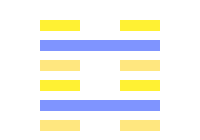
29.2.3.5.6 (29 > 52) - THE KHAN HEXAGRAM.
- 2. The second line, undivided, shows its subject in all the peril of the defile. He will, however, get a little (of the deliverance) that he seeks.
- 3. The third line, divided, shows its subject, whether he comes or goes ( = descends or ascends), confronted by a defile. All is peril to him and unrest. (His endeavours) will lead him into the cavern of the pit. There should be no action (in such a case).
- 5. The fifth line, undivided, shows the water of the defile not yet full, (so that it might flow away) ; but order will (soon) be brought about. There will be no error.
- 6. The topmost line, divided, shows its subject bound with cords of three strands or two strands, and placed in the thicket of thorns. But in three years he does not learn the course for him to pursue. There will be evil.
29.2.3.5.6 (29 > 52) - Spoiling prematurely
One exhausts one's guests by treating them like gods.
Bing DeepL Google Yandex29.2.3.5.6 (29 > 52) - Spoiling prematurely
One exhausts one's guests by treating them like gods.
Bing DeepL Google Yandex29.2.3.5.6 (29 > 52) - K’ân, l’abîme
K’ān : danger, précipice, caverne. — Tsa k’ān : courir de grands risques ; s’exposer au danger pour un autre.
-
2. Dans les écueils périlleux, si on sait modérer ses sentiments, on pourra en sortir heureusement.
Si on garde la modération. - 3. Si en tout et partout on ne rencontre que danger, que les périls, les sujets de crainte s’accumulent, alors dans un tel danger, il n’y a plus d’expédient qui puisse servir. — Il n’y aura plus de secours possible.
- 5. Mais si le danger n’est pas inéluctable, si une caverne où l’on se trouve n’est point pleine d’eau et qu’on puisse encore aplanir le terrain, on en sortira sans faute. — Il n’arrivera pas malheur.
- 6. Danger de celui qui, lié, vinculé de triples liens, enfermé dans un cachot, ne peut de longtemps parvenir à se délivrer. Sort funeste ! — Tel est celui qui a perdu la voie de la sagesse
29.2.3.5.6 (29 > 52) - Gâter prématurément
On épuise ses invités en les traitant comme des dieux.
Bing DeepL Google Yandex29.2.3.5.6 (29 > 52) - Mélység
- 2. Ha valaki túl nagy nehézségekkel kerül szembe, rá kell hagynia olyanokra akik tudják kezelni azokat.
- 3. Látják amit elrontott így odébbáll.
- 5. Mielőtt visszatérne hogy segítsen másokon, szünetet kell tartania és fel kell készülnie hogy válaszoljon a közelállóknak.
- 6. Ha túl fáradt, meg kell állnia és később folytatnia.
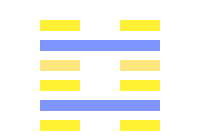
29.1.2.3.5.6 (29 > 22) - THE KHAN HEXAGRAM.
- 1. The first line, divided, shows its subject in the double defile, and (yet) entering a cavern within it. There will be evil.
- 2. The second line, undivided, shows its subject in all the peril of the defile. He will, however, get a little (of the deliverance) that he seeks.
- 3. The third line, divided, shows its subject, whether he comes or goes ( = descends or ascends), confronted by a defile. All is peril to him and unrest. (His endeavours) will lead him into the cavern of the pit. There should be no action (in such a case).
- 5. The fifth line, undivided, shows the water of the defile not yet full, (so that it might flow away) ; but order will (soon) be brought about. There will be no error.
- 6. The topmost line, divided, shows its subject bound with cords of three strands or two strands, and placed in the thicket of thorns. But in three years he does not learn the course for him to pursue. There will be evil.
29.1.2.3.5.6 (29 > 22) - Finding an explanation
One puts into context an event that others cannot understand.
Bing DeepL Google Yandex29.1.2.3.5.6 (29 > 22) - Finding an explanation
One puts into context an event that others cannot understand.
Bing DeepL Google Yandex29.1.2.3.5.6 (29 > 22) - K’ân, l’abîme
K’ān : danger, précipice, caverne. — Tsa k’ān : courir de grands risques ; s’exposer au danger pour un autre.
- 1. Courir des dangers, comme entrer dans une caverne d’un défilé dangereux, est chose redoutable.
-
2. Dans les écueils périlleux, si on sait modérer ses sentiments, on pourra en sortir heureusement.
Si on garde la modération. - 3. Si en tout et partout on ne rencontre que danger, que les périls, les sujets de crainte s’accumulent, alors dans un tel danger, il n’y a plus d’expédient qui puisse servir. — Il n’y aura plus de secours possible.
- 5. Mais si le danger n’est pas inéluctable, si une caverne où l’on se trouve n’est point pleine d’eau et qu’on puisse encore aplanir le terrain, on en sortira sans faute. — Il n’arrivera pas malheur.
- 6. Danger de celui qui, lié, vinculé de triples liens, enfermé dans un cachot, ne peut de longtemps parvenir à se délivrer. Sort funeste ! — Tel est celui qui a perdu la voie de la sagesse
29.1.2.3.5.6 (29 > 22) - Trouver une explication
On replace dans son contexte un événement que les autres n'arrivent pas à comprendre.
Bing DeepL Google Yandex29.1.2.3.5.6 (29 > 22) - Mélység
- 1. Ha egy nehézséggel találkozott, meg kell oldania mielőtt elkezdene foglalkozni egy másikkal.
- 2. Ha valaki túl nagy nehézségekkel kerül szembe, rá kell hagynia olyanokra akik tudják kezelni azokat.
- 3. Látják amit elrontott így odébbáll.
- 5. Mielőtt visszatérne hogy segítsen másokon, szünetet kell tartania és fel kell készülnie hogy válaszoljon a közelállóknak.
- 6. Ha túl fáradt, meg kell állnia és később folytatnia.
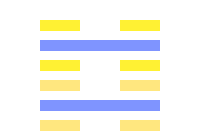
29.2.4.5.6 (29 > 35) - THE KHAN HEXAGRAM.
- 2. The second line, undivided, shows its subject in all the peril of the defile. He will, however, get a little (of the deliverance) that he seeks.
- 4. The fourth line, divided, shows its subject (at a feast), with (simply) a bottle of spirits, and a subsidiary basket of rice, while (the cups and bowls) are (only) of earthenware. He introduces his important lessons (as his ruler's) intelligence admits. There will in the end be no error.
- 5. The fifth line, undivided, shows the water of the defile not yet full, (so that it might flow away) ; but order will (soon) be brought about. There will be no error.
- 6. The topmost line, divided, shows its subject bound with cords of three strands or two strands, and placed in the thicket of thorns. But in three years he does not learn the course for him to pursue. There will be evil.
29.2.4.5.6 (29 > 35) - Refueling
One recovers strength before going to face one's opponents.
29.2.4.5.6 (29 > 35) - Refueling
One recovers strength before going to face one's opponents.
29.2.4.5.6 (29 > 35) - K’ân, l’abîme
K’ān : danger, précipice, caverne. — Tsa k’ān : courir de grands risques ; s’exposer au danger pour un autre.
-
2. Dans les écueils périlleux, si on sait modérer ses sentiments, on pourra en sortir heureusement.
Si on garde la modération. - 4. Si l’on offre des sacrifices avec simplicité (sans ostentation), avec un vase de spiritueux et une corbeille de grains, tandis que les assistants n’ont que des vases de terre, si par cette modération on se forme à la vertu, alors qu’on aurait d’abord des difficultés et des écueils, on deviendra irréprochable. (Moyen d’éviter les dangers.)
- 5. Mais si le danger n’est pas inéluctable, si une caverne où l’on se trouve n’est point pleine d’eau et qu’on puisse encore aplanir le terrain, on en sortira sans faute. — Il n’arrivera pas malheur.
- 6. Danger de celui qui, lié, vinculé de triples liens, enfermé dans un cachot, ne peut de longtemps parvenir à se délivrer. Sort funeste ! — Tel est celui qui a perdu la voie de la sagesse
29.2.4.5.6 (29 > 35) - Se restaurer
On reprend des forces avant d'aller affronter ses adversaires.
Bing DeepL Google Yandex29.2.4.5.6 (29 > 35) - Mélység
- 2. Ha valaki túl nagy nehézségekkel kerül szembe, rá kell hagynia olyanokra akik tudják kezelni azokat.
- 4. Ha valaki eszközök híján van, meg kell elégednie egyszerű dolgokkal.
- 5. Mielőtt visszatérne hogy segítsen másokon, szünetet kell tartania és fel kell készülnie hogy válaszoljon a közelállóknak.
- 6. Ha túl fáradt, meg kell állnia és később folytatnia.
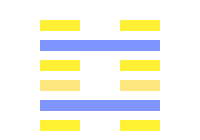
29.1.2.4.5.6 (29 > 21) - THE KHAN HEXAGRAM.
- 1. The first line, divided, shows its subject in the double defile, and (yet) entering a cavern within it. There will be evil.
- 2. The second line, undivided, shows its subject in all the peril of the defile. He will, however, get a little (of the deliverance) that he seeks.
- 4. The fourth line, divided, shows its subject (at a feast), with (simply) a bottle of spirits, and a subsidiary basket of rice, while (the cups and bowls) are (only) of earthenware. He introduces his important lessons (as his ruler's) intelligence admits. There will in the end be no error.
- 5. The fifth line, undivided, shows the water of the defile not yet full, (so that it might flow away) ; but order will (soon) be brought about. There will be no error.
- 6. The topmost line, divided, shows its subject bound with cords of three strands or two strands, and placed in the thicket of thorns. But in three years he does not learn the course for him to pursue. There will be evil.
29.1.2.4.5.6 (29 > 21) - Wanting more and more
One is asking even more of those who have already given everything.
Bing DeepL Google Yandex29.1.2.4.5.6 (29 > 21) - Wanting more and more
One is asking even more of those who have already given everything.
Bing DeepL Google Yandex29.1.2.4.5.6 (29 > 21) - K’ân, l’abîme
K’ān : danger, précipice, caverne. — Tsa k’ān : courir de grands risques ; s’exposer au danger pour un autre.
- 1. Courir des dangers, comme entrer dans une caverne d’un défilé dangereux, est chose redoutable.
-
2. Dans les écueils périlleux, si on sait modérer ses sentiments, on pourra en sortir heureusement.
Si on garde la modération. - 4. Si l’on offre des sacrifices avec simplicité (sans ostentation), avec un vase de spiritueux et une corbeille de grains, tandis que les assistants n’ont que des vases de terre, si par cette modération on se forme à la vertu, alors qu’on aurait d’abord des difficultés et des écueils, on deviendra irréprochable. (Moyen d’éviter les dangers.)
- 5. Mais si le danger n’est pas inéluctable, si une caverne où l’on se trouve n’est point pleine d’eau et qu’on puisse encore aplanir le terrain, on en sortira sans faute. — Il n’arrivera pas malheur.
- 6. Danger de celui qui, lié, vinculé de triples liens, enfermé dans un cachot, ne peut de longtemps parvenir à se délivrer. Sort funeste ! — Tel est celui qui a perdu la voie de la sagesse
29.1.2.4.5.6 (29 > 21) - Vouloir toujours plus
On réclame encore davantage à ceux qui ont déjà tout donné.
Bing DeepL Google Yandex29.1.2.4.5.6 (29 > 21) - Mélység
- 1. Ha egy nehézséggel találkozott, meg kell oldania mielőtt elkezdene foglalkozni egy másikkal.
- 2. Ha valaki túl nagy nehézségekkel kerül szembe, rá kell hagynia olyanokra akik tudják kezelni azokat.
- 4. Ha valaki eszközök híján van, meg kell elégednie egyszerű dolgokkal.
- 5. Mielőtt visszatérne hogy segítsen másokon, szünetet kell tartania és fel kell készülnie hogy válaszoljon a közelállóknak.
- 6. Ha túl fáradt, meg kell állnia és később folytatnia.

29.2.3.4.5.6 (29 > 56) - THE KHAN HEXAGRAM.
- 2. The second line, undivided, shows its subject in all the peril of the defile. He will, however, get a little (of the deliverance) that he seeks.
- 3. The third line, divided, shows its subject, whether he comes or goes ( = descends or ascends), confronted by a defile. All is peril to him and unrest. (His endeavours) will lead him into the cavern of the pit. There should be no action (in such a case).
- 4. The fourth line, divided, shows its subject (at a feast), with (simply) a bottle of spirits, and a subsidiary basket of rice, while (the cups and bowls) are (only) of earthenware. He introduces his important lessons (as his ruler's) intelligence admits. There will in the end be no error.
- 5. The fifth line, undivided, shows the water of the defile not yet full, (so that it might flow away) ; but order will (soon) be brought about. There will be no error.
- 6. The topmost line, divided, shows its subject bound with cords of three strands or two strands, and placed in the thicket of thorns. But in three years he does not learn the course for him to pursue. There will be evil.
29.2.3.4.5.6 (29 > 56) - Finding a common ground
One ends an altercation by offering to share the blame between those who are fighting.
Bing DeepL Google Yandex29.2.3.4.5.6 (29 > 56) - Finding a common ground
One ends an altercation by offering to share the blame between those who are fighting.
Bing DeepL Google Yandex29.2.3.4.5.6 (29 > 56) - K’ân, l’abîme
K’ān : danger, précipice, caverne. — Tsa k’ān : courir de grands risques ; s’exposer au danger pour un autre.
-
2. Dans les écueils périlleux, si on sait modérer ses sentiments, on pourra en sortir heureusement.
Si on garde la modération. - 3. Si en tout et partout on ne rencontre que danger, que les périls, les sujets de crainte s’accumulent, alors dans un tel danger, il n’y a plus d’expédient qui puisse servir. — Il n’y aura plus de secours possible.
- 4. Si l’on offre des sacrifices avec simplicité (sans ostentation), avec un vase de spiritueux et une corbeille de grains, tandis que les assistants n’ont que des vases de terre, si par cette modération on se forme à la vertu, alors qu’on aurait d’abord des difficultés et des écueils, on deviendra irréprochable. (Moyen d’éviter les dangers.)
- 5. Mais si le danger n’est pas inéluctable, si une caverne où l’on se trouve n’est point pleine d’eau et qu’on puisse encore aplanir le terrain, on en sortira sans faute. — Il n’arrivera pas malheur.
- 6. Danger de celui qui, lié, vinculé de triples liens, enfermé dans un cachot, ne peut de longtemps parvenir à se délivrer. Sort funeste ! — Tel est celui qui a perdu la voie de la sagesse
29.2.3.4.5.6 (29 > 56) - Trouver un terrain d'entente
On met fin à une altercation en proposant à ceux qui s'affrontent de partager les torts.
Bing DeepL Google Yandex29.2.3.4.5.6 (29 > 56) - Mélység
- 2. Ha valaki túl nagy nehézségekkel kerül szembe, rá kell hagynia olyanokra akik tudják kezelni azokat.
- 3. Látják amit elrontott így odébbáll.
- 4. Ha valaki eszközök híján van, meg kell elégednie egyszerű dolgokkal.
- 5. Mielőtt visszatérne hogy segítsen másokon, szünetet kell tartania és fel kell készülnie hogy válaszoljon a közelállóknak.
- 6. Ha túl fáradt, meg kell állnia és később folytatnia.
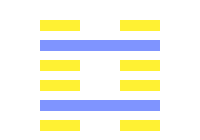
29.1.2.3.4.5.6 (29 > 30) - THE KHAN HEXAGRAM.
- 1. The first line, divided, shows its subject in the double defile, and (yet) entering a cavern within it. There will be evil.
- 2. The second line, undivided, shows its subject in all the peril of the defile. He will, however, get a little (of the deliverance) that he seeks.
- 3. The third line, divided, shows its subject, whether he comes or goes ( = descends or ascends), confronted by a defile. All is peril to him and unrest. (His endeavours) will lead him into the cavern of the pit. There should be no action (in such a case).
- 4. The fourth line, divided, shows its subject (at a feast), with (simply) a bottle of spirits, and a subsidiary basket of rice, while (the cups and bowls) are (only) of earthenware. He introduces his important lessons (as his ruler's) intelligence admits. There will in the end be no error.
- 5. The fifth line, undivided, shows the water of the defile not yet full, (so that it might flow away) ; but order will (soon) be brought about. There will be no error.
- 6. The topmost line, divided, shows its subject bound with cords of three strands or two strands, and placed in the thicket of thorns. But in three years he does not learn the course for him to pursue. There will be evil.
29.1.2.3.4.5.6 (29 > 30) - Not risking more
One lacks courage to dare tempting the devil once again.
Bing DeepL Google Yandex29.1.2.3.4.5.6 (29 > 30) - Not risking more
One lacks courage to dare tempting the devil once again.
Bing DeepL Google Yandex29.1.2.3.4.5.6 (29 > 30) - K’ân, l’abîme
K’ān : danger, précipice, caverne. — Tsa k’ān : courir de grands risques ; s’exposer au danger pour un autre.
- 1. Courir des dangers, comme entrer dans une caverne d’un défilé dangereux, est chose redoutable.
-
2. Dans les écueils périlleux, si on sait modérer ses sentiments, on pourra en sortir heureusement.
Si on garde la modération. - 3. Si en tout et partout on ne rencontre que danger, que les périls, les sujets de crainte s’accumulent, alors dans un tel danger, il n’y a plus d’expédient qui puisse servir. — Il n’y aura plus de secours possible.
- 4. Si l’on offre des sacrifices avec simplicité (sans ostentation), avec un vase de spiritueux et une corbeille de grains, tandis que les assistants n’ont que des vases de terre, si par cette modération on se forme à la vertu, alors qu’on aurait d’abord des difficultés et des écueils, on deviendra irréprochable. (Moyen d’éviter les dangers.)
- 5. Mais si le danger n’est pas inéluctable, si une caverne où l’on se trouve n’est point pleine d’eau et qu’on puisse encore aplanir le terrain, on en sortira sans faute. — Il n’arrivera pas malheur.
- 6. Danger de celui qui, lié, vinculé de triples liens, enfermé dans un cachot, ne peut de longtemps parvenir à se délivrer. Sort funeste ! — Tel est celui qui a perdu la voie de la sagesse
29.1.2.3.4.5.6 (29 > 30) - Ne pas risquer plus
On manque de courage pour oser tenter le diable encore une fois.
Bing DeepL Google Yandex29.1.2.3.4.5.6 (29 > 30) - Mélység
- 1. Ha egy nehézséggel találkozott, meg kell oldania mielőtt elkezdene foglalkozni egy másikkal.
- 2. Ha valaki túl nagy nehézségekkel kerül szembe, rá kell hagynia olyanokra akik tudják kezelni azokat.
- 3. Látják amit elrontott így odébbáll.
- 4. Ha valaki eszközök híján van, meg kell elégednie egyszerű dolgokkal.
- 5. Mielőtt visszatérne hogy segítsen másokon, szünetet kell tartania és fel kell készülnie hogy válaszoljon a közelállóknak.
- 6. Ha túl fáradt, meg kell állnia és később folytatnia.

